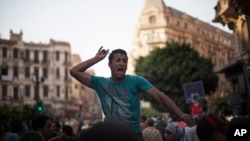Egyptian President Mohammed Morsi is scheduled to address the nation Wednesday, in advance of planned protests aimed at forcing him to step down.
Aides have given no indications of what he will say.
Opposition groups are demanding Morsi's resignation, some frustrated with his style of Isalmist rule. Other Egyptians say they are angry over the decline in quality of life - and rising prices - under his administration.
Drivers jammed the streets of the capital Wednesday, honking their horns and venting their anger at the government over ongoing fuel shortages.
Ibrahim Samir was one of them. He blames Morsi and his government.
"We have a government that is clueless, and a president that is clueless," Ibrahim said. "The government doesn't know anything about anything. As you can see here, we've been waiting in this queue for three hours, and there's no petrol."
Others, like Ali Kamel, accuse the government of doing whatever it can to undercut the protests.
"This petrol crisis, it is done intentionally," he charged. "They [the government] are the ones behind it, so that we don't go down [to protest] on the 30th [of June]. But we are going down on the 30th. Actually we will go down starting tomorrow, not the 30th."
Egyptian army officials, speaking on the condition of anonymity, say bases near major cities have been reinforced with additional troops and armored divisions.
Top military officials have been urging Morsi and opposition groups to reach an understanding without resorting to bloodshed.
Speaking in Kuwait Wednesday, U.S. Secretary of State John Kerry said everyone is concerned about the situation in Egypt. He also expressed hope that the upcoming demonstrations will avoid violence.
Aides have given no indications of what he will say.
Opposition groups are demanding Morsi's resignation, some frustrated with his style of Isalmist rule. Other Egyptians say they are angry over the decline in quality of life - and rising prices - under his administration.
Drivers jammed the streets of the capital Wednesday, honking their horns and venting their anger at the government over ongoing fuel shortages.
Ibrahim Samir was one of them. He blames Morsi and his government.
"We have a government that is clueless, and a president that is clueless," Ibrahim said. "The government doesn't know anything about anything. As you can see here, we've been waiting in this queue for three hours, and there's no petrol."
Others, like Ali Kamel, accuse the government of doing whatever it can to undercut the protests.
"This petrol crisis, it is done intentionally," he charged. "They [the government] are the ones behind it, so that we don't go down [to protest] on the 30th [of June]. But we are going down on the 30th. Actually we will go down starting tomorrow, not the 30th."
Egyptian army officials, speaking on the condition of anonymity, say bases near major cities have been reinforced with additional troops and armored divisions.
Top military officials have been urging Morsi and opposition groups to reach an understanding without resorting to bloodshed.
Speaking in Kuwait Wednesday, U.S. Secretary of State John Kerry said everyone is concerned about the situation in Egypt. He also expressed hope that the upcoming demonstrations will avoid violence.





